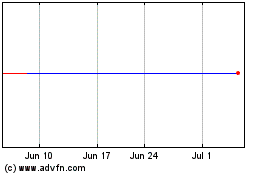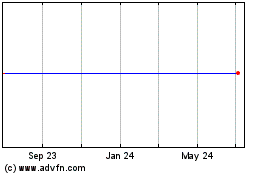By Rachael King
EMC Corp. on Monday reported positive second-quarter results as
it prepared for a shareholder vote on its acquisition by privately
held Dell Inc. in the largest technology merger in history.
The Hopkinton, Mass., company's profit rose 19%, and both bottom
and top lines beat analyst expectations.
"We had a strong second quarter and are well positioned as we
look forward to combining with Dell," EMC Chief Executive Joe Tucci
said in a statement.
Shareholders will meet Tuesday at EMC's headquarters to vote on
Dell's $60 billion offer. If they support the deal, regulatory
approval from China will be all that stands in the way of the
tie-up.
Financial analysts generally expect the transaction to be
completed. "They're pretty far along in the process, and it does
not look like there's anything that could derail the deal," said
Abhey Lamba, managing director with Mizuho Securities USA Inc.
Dell, a leading maker of PCs and servers, is battling persistent
declines in computer sales as users turn to mobile devices and
other newer form factors. In acquiring EMC's line of data-storage
hardware -- including VMware Inc.'s data center software -- it aims
to create the leading one-stop shop for information technology sold
to businesses.
The vast majority of Dell's and EMC's revenue comes from sales
of servers and storage equipment. These segments are under
relentless pressure as corporate customers become less interested
in running equipment in their own data centers and turn to cloud
service providers.
Nonetheless, there is plenty of money to be made selling
on-premises hardware, analysts said. For example, the 2015
world-wide market for enterprise storage systems was $37.2 billion,
according to market watcher International Data Corp. Based on that
tally, EMC and Dell would be the largest vendor, holding 28.9% of
the market.
Once combined, the two companies plan to help customers move to
cloud computing, which likely would be a hybrid approach that
includes both cloud and on-premises operations, said one person
familiar with the matter.
The combined companies may also be in a good position to sell
low-margin hardware to companies in markets such as
telecommunications and financial services that are building their
own cloud computing facilities. The newly combined company, to be
called Dell Technologies, will edge out Hewlett Packard Enterprise
Co. as the leading vendor by revenue in the world-wide $29 billion
market supplying hardware to cloud computing providers. In 2015,
Dell and EMC combined garnered 18.2% of the highly fragmented
market, compared with HPE's 15.7%, according to market watcher
International Data Corp.
That position should give the combined company an efficient
supply chain that could boost margins. "If you have a largely
commodity-based hardware business, the bigger scale means you have
better negotiations with suppliers and vendors and that ought to
help [Dell and EMC]," said Scott Kupor, managing partner at
venture-capital firm Andreessen Horowitz.
The deal will also let Dell exploit a product category pioneered
by EMC, known as converged infrastructure, to sell computing,
storage and networking equipment as an easy-to-install bundle.
"You get an unbelievably strong position when you put Dell and
EMC together in that very important, growing space," Michael Dell
told The Wall Street Journal in October.
The merger, in addition to being the largest tech deal in
history, is extraordinarily complex. Dell, which is privately held,
aims to buy not only EMC but its Byzantine federation of wholly and
partially owned subsidiaries, including cybersecurity firm RSA
Security LLC, software development company Pivotal Software Inc.,
and virtualization software vendor VMware.
The tie-up will be financed through a combination of stock, cash
and up to $49.5 billion in debt. Up to $4.25 billion in equity
financing from a variety of sources including Michael Dell's
investments, private-equity firm Silver Lake and investment company
Temasek Holdings Pte. Ltd. Together, the two companies will make
available at least $7.7 billion in cash on hand to finance merger
activities once the deal is completed.
Dell parent company Denali Holding Inc. will pay EMC
shareholders $24.05 a share and 0.111 shares of a tracking stock
that is tied to VMware's share price. VMware's share price has
dropped about 24% since the deal was announced, which means the
value of the deal decreased about $7 billion over that period.
The merger will give current EMC shareholders a tracking stock
for VMware shares. Consequently, the privately held Dell will issue
quarterly financial reports.
Competitors say Dell and EMC will take on such a huge debt
burden that it may be difficult for them to fund innovation. "My
view is that they are doubling down on old technology in a cost
takeout play," Meg Whitman, CEO of Hewlett Packard Enterprise, said
in an interview. The only way to carry this amount of debt is to
cut costs dramatically, she added.
Last week, Michael Dell told industry publication CRN that the
acquisition gives Dell enormous flexibility to invest in the
business, including research and development, thanks to low debt
interest rates.
VMware CEO Pat Gelsinger told the Journal in June that he
expects the deal to give his company a boost because of its broad
reach into the market. "Dell can accelerate our growth by $1
billion over the next several years," he said.
Over all, EMC reported $581 million, or 29 cents a share, up
from $487 million, or 25 cents a share, a year earlier. Excluding
stock-based compensation and other items, adjusted per-share
earnings rose to 45 cents from 43 cents. Revenue increased 0.3% to
$6.02 billion.
As for VMware, the company earned $265 million, or 62 cents a
share, in the quarter ended June 30, compared with a profit of $172
million, or 40 cents a share, a year earlier. Excluding certain
items, adjusted per-share earnings rose to 97 cents from 93 cents a
year ago. Sales rose 11.3% to $1.69 billion.
Tess Stynes contributed to this article.
Write to Rachael King at rachael.king@wsj.com
(END) Dow Jones Newswires
July 18, 2016 19:40 ET (23:40 GMT)
Copyright (c) 2016 Dow Jones & Company, Inc.
Global X Funds (NYSE:EMC)
Historical Stock Chart
From Mar 2024 to Apr 2024

Global X Funds (NYSE:EMC)
Historical Stock Chart
From Apr 2023 to Apr 2024
